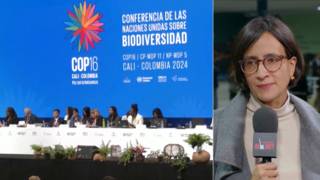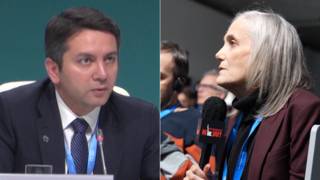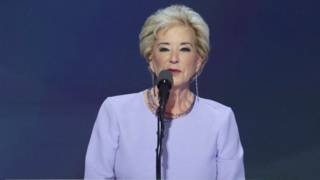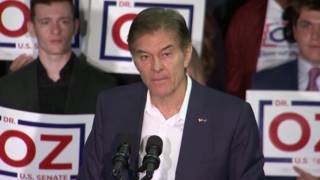
Related
Guests
- Zaid Jilanistaff reporter at The Intercept.
- Trita Parsifounder and president of the National Iranian American Council. He’s the author of Losing an Enemy: Obama, Iran, and the Triumph of Diplomacy.
Confirmation hearings begin today for Mike Pompeo, the CIA director, tapped by President Trump to become the next secretary of state. Last year the Senate confirmed Pompeo to head the CIA by a vote of 66 to 32, but the vote is expected to be far closer this year. At least one Republican—Rand Paul—has already announced he will vote against Pompeo due to his support for the Iraq invasion and for torture. Pompeo also has a long history of ties to Islamophobic organizations, and the National Iranian American Council has warned that Pompeo’s confirmation would threaten the Iran nuclear deal and increase the risk of a U.S. attack on Iran. We discuss Pompeo’s nomination with Trita Parsi, president of the National Iranian American Council, and Zaid Jilani, a staff reporter at The Intercept.
Transcript
NERMEEN SHAIKH: Confirmation hearings begin today for Mike Pompeo, the CIA director, tapped by President Trump to become the next secretary of state. Last year, the Senate confirmed Pompeo to head the CIA by a vote of 66 to 32, but the vote is expected to be far closer this year. At least one Republican—Rand Paul—has already announced he will vote against Pompeo due to his support for the Iraq invasion and for torture. And more Democrats are expected to oppose him this round. Democratic Senator Brian Schatz of Hawaii said on Twitter, quote, “I voted YES on Pompeo for CIA on the theory that he would be the 'adult in the room.' I was wrong. I am voting NO on Pompeo for Secretary of State because our top diplomat should believe in diplomacy. He has an alarming tendency towards military provocation and brinkmanship.”
Pompeo is a former congressman from Kansas, where he was widely known to be the Koch brothers’ favorite lawmaker. He once wrote an article for Politico titled “Stop harassing the Koch brothers.”
AMY GOODMAN: Pompeo also has a long history of ties to Islamophobic organizations. The group Act for America, which is considered the largest anti-Muslim group in America, awarded Pompeo its highest honor, the National Security Eagle Award, in 2016. The Southern Poverty Law Center considers the organization a hate group.
On the foreign policy front, the National Iranian American Council has warned Pompeo’s confirmation would threaten the Iran nuclear deal and increase the risk of a U.S. attack on Iran. Pompeo is also a vocal climate change denier. More than 200 environmental groups wrote a letter this week to senators urging Pompeo’s rejection.
We’re joined now by two guests. Trita Parsi is founder and president of the National Iranian American Council, author of Losing an Enemy: Obama, Iran, and the Triumph of Diplomacy. And Zaid Jilani is a staff reporter at The Intercept.
Zaid, you’ve been on Capitol Hill following what’s happening in the preparations for the hearing today for Pompeo to become secretary of state. Talk about what you’ve found.
ZAID JILANI: Yeah, it’s actually very interesting, because unlike a number of the nominees that went through last year when the Trump administration sort of initially staffed up, Mike Pompeo’s nomination is actually in a bit of danger. One, as you played earlier, Senator Rand Paul, a leading Senate Republican on the Senate Foreign Relations Committee, has already come out and said that he would try to block his nomination. Now, recall that when Pompeo was confirmed as CIA director, he received the support of 14 Senate Democrats as well as one independent, Angus King of Maine. That basically creates a calculus where, on the Senate Foreign Relations Committee, they could effectively block Pompeo’s nomination, due to the new sort of Senate dynamics.
Now, it is possible that they could bring Pompeo directly to the floor and bypass the committee, but that really hasn’t happened, I think, in decades, or, ultimately, if President Trump really wants to appoint him, he could always use a recess appointment. But sort of forcing them to take those steps would withdraw a lot of political capital from the Trump administration and could—you know, if the Democrats—I believe Senator Paul has said something about Gina Haspel, who is nominated for CIA director, but it also applies here, which is that he said that if the Democrats show solidarity, they can block these nominations.
And I think that a number of them—and you played the—you know, you actually played the tweet from Brian Schatz, where he said he sort of changed his mind. I think a lot of those Democrats right now, you know, it’s big question mark for them. A lot of them have not announced yet that they’re going to continue to support Pompeo like they did last year. So I think that’s really the big question in the room, is whether the Senate Democratic Caucus will stick together with Rand Paul and sort of block the nomination, or attempt to at least attempt slow it down.
AMY GOODMAN: Brian Schatz saying, “I voted YES on Pompeo for CIA on the theory [that] he would be the 'adult in the room.' I was wrong. I am voting NO on Pompeo for Secretary of State because our top diplomat should believe in diplomacy. He has an alarming tendency towards military provocation and brinkmanship.” Zaid?
ZAID JILANI: Yes, well, I think, you know, that tweet shows sort of a—you know, there’s a learning curve, I think, among members of Congress. I think there was a logical error sort of made towards President Trump at the beginning, whereas—you know, I think he was perceived as having sort of a very strong ideological bent, and they needed security state figures, like generals. For instance, a lot of senators, including even Bernie Sanders, voted for John Kelly to lead DHS for the same reason.
But I think a more—I think what we’re coming around to in Washington is understanding that Trump doesn’t really have a very strong ideological bent. He’s more of a pragmatist. But he’s very malleable when it comes to the people who are around him. So, I think that in the first term, or the first year of President Trump’s presidency, we’ve seen sort of moderate hawks around him, people who could easily have worked for Obama, most of them, of for Clinton. But I think now that you’re seeing, you know, maybe Gina Haspel at CIA, John Bolton being national security adviser, Mike Pompeo at CIA, I think that that would be a tangible shift to the right. And I think that, you know, that’s scaring a lot of, I think, people who were willing to go along with that strategy a year ago, like Brian Schatz.
NERMEEN SHAIKH: Well, Trita Parsi, could you talk about some of your concerns with Pompeo, and, in particular, the concerns that others have also expressed, that in nominating Mike Pompeo, Trump is more or less putting together a war cabinet, given that John Bolton has also just come in earlier this week as national security adviser?
TRITA PARSI: Yes, I think that is very much part of the context here that I think is also giving a lot of senators pause, which is that this is not just a vote for Pompeo. This would be to enable Donald Trump to have a Cabinet in which you have no longer these mythical “adults in the room” any longer, but rather almost exclusively yes men. And as a result, I think what is emerging on Capitol Hill is a understanding that a vote for Pompeo is essentially a vote for John Bolton, and a vote for John Bolton is a vote for war. And I think that has been one of the factors that has really changed the dynamics, because it’s going to be very difficult for the Democrats to be able to justify such a vote, particularly mindful of the fact that we are very likely to see the death of the Iran nuclear deal, which then, once again, will open up the pathway for a war between the United States and Iran. You don’t want to be a senator that has actually enabled that to happen by casting a vote for Pompeo, if you’re on the Democratic side, as well as some Republicans. I mean, I think right now a lot of eyes are going to be on Senator Jeff Flake, because if Flake decides to vote against and all of the Democrats vote against, then Pompeo’s nomination is dead.
AMY GOODMAN: I’d like to turn to Pompeo, speaking to Face the Nation about Iran and North Korea.
MIKE POMPEO: My critique of the Obama administration’s JCPOA commitment was that they left the Iranians with a breakout capacity. They had a short time frame that these would—these restrictions would remain in place. And North Korea’s human capital and enrichment capacity continues to remain in place. Those are—those are all things that present risk to the world, and President Obama is—or, excuse me, President Trump is determined to prevent that from happening in North Korea.
AMY GOODMAN: Trita Parsi?
TRITA PARSI: Well, here again, I think you’re seeing that Pompeo is saying something very different once he got through the CIA nomination than what he said at the CIA nomination hearings. Then, he struck a much more moderate tone, being very aware of that his hawkishness would be a concern for a lot of senators. And having read his—the transcript of his statement that he’s going to give today, it’s very clear that he’s very worried about this once again.
But his views, I think, have become quite clear now. They’re undeniable. His rejection of the Iran deal is part of the reason why he’s being nominated by Donald Trump to be secretary of state. And his arguments in regards to the breakout capability is entirely wrong, because in the case of the Iran deal, the breakout capability has been extended to one full year, which then, combined with the very, very intrusive inspections, makes it essentially impossible for the Iranians to be able to build a nuclear bomb without getting detected very, very early, which gives the world an opportunity to intervene. That is, of course, all based on the idea that we live up to our end of the bargain of this deal and allow those inspections to continue. But if we pull out of the deal, which Trump is very likely to do, particularly with people like Bolton and Pompeo around him, then we lose the inspections. And if we lose the inspections, forget about a 12-month breakout capability. That’s when the real danger comes in. So, the path that Pompeo is arguing for is actually the exact path that would lead us to some of these disastrous consequences.
And one approach that he’s had to all of this, that I think we should be very concerned about, is that as head of CIA, he was presented with evidence from the CIA that show that the Iranians are living up to the deal. His response was, “Well, we know that they’re still cheating.” He had no evidence for that, but he had already drawn that conclusion. That reminds us of what happened during the Iraq War, in which the conclusion was drawn first, and then the CIA was being asked, “Now go find the evidence for it.”
NERMEEN SHAIKH: Well, Trita, I want to go to another related issue, which is his—Pompeo’s well-documented Islamophobia. Now, in June 2013, two months after the Boston Marathon bombing, then-Congressman Mike Pompeo erroneously claimed Muslim groups had not condemned the attack.
REP. MIKE POMPEO: It’s been just under two months since the attacks in Boston, and in those intervening weeks, the silence of Muslim leaders has been deafening. … When the most devastating terrorist attacks on America in the last 20 years come overwhelmingly from people of a single faith and are performed in the name of that faith, a special obligation falls on those that are the leaders of that faith. Silence has made these Islamic leaders across America potentially complicit in these acts. … If a religion claims to be one of peace, Mr. Speaker, its leaders must reject violence that is perpetrated in its name.
NERMEEN SHAIKH: A day after Pompeo gave those remarks, the Council on American-Islamic Relations wrote to him demanding an apology. CAIR and a number of other Muslim—major Muslim organizations had in fact condemned the marathon bombings, many within hours of the attack, and organized blood drives and other relief efforts in Boston. Pompeo never apologized or responded to the letter from CAIR. So, Trita Parsi, can you—can you talk about that and your concerns about the way in which Mike Pompeo has spoken about Muslims in America?
TRITA PARSI: Well, I think, once again, we’re saying that his line of thinking is very much in line with the thinking of Donald Trump here. So, rather than being someone that actually would be able to bring in a different perspective into the White House, balance things, be an “adult in the room,” as Brian Schatz originally thought Pompeo would be, instead we’re seeing someone that actually will be enabling the worst instincts of Donald Trump. And I think this will be very dangerous to have someone as the secretary of state holding those views, because these are views that are considered and are extremist views, and it’s going to create additional problems for the United States if, in its diplomacy with the rest of the world, is propagating views of this kind.
AMY GOODMAN: 2015, Mike Pompeo appeared on the radio show of longtime Islamophobe Frank Gaffney, Pompeo agreeing with Gaffney that then-President Obama had a, quote, “affinity for Muslim terrorists.” This clip begins with Gaffney.
FRANK GAFFNEY: I wonder whether in fact what the president is conveying to them is not simply that he doesn’t understand, but that there’s really kind of an affinity for, if not the violent beheading and crucifixions and, you know, slaying of Christians and all that, but at least for the cause in which these guys are engaged in such activities. Given you’re watching this very closely, of course, from your vantage point on the Intelligence Committee, could that possibly be a takeaway for bad guys who hear him saying nothing about their ideological agenda?
REP. MIKE POMPEO: Frank, every place you stare at the president’s policies and statements, you see what you just described. So, the Egyptians bomb terrorists in eastern Libya, and the administration says, 'Gosh, we can't support that.’ The Egyptians, under their leader, el-Sisi, begin to push back inside the ideology of the faith, and our president refuses to talk about it that way. Today, Americans are sitting at a table with the Iranians, the largest state sponsor of terror in the world, treating them as if they’re a negotiating partner. Every policy of this administration has treated America as if we are the problem and not the solution to keeping not only America safe, but a stable world.
AMY GOODMAN: So, that’s Mike Pompeo in 2015. Zaid Jilani, if you can talk about this and how this is being discussed on Capitol Hill right now? Again, connections to a number of anti-Islamic groups, not to mention these kind of views.
ZAID JILANI: Well, I think this is exactly the kind of thing that we would expect Congress to start interrogating Pompeo on today, when he starts—has his first hearing before the Foreign Relations Committee folks. You know, Pompeo not only has appeared and made some sort of offensive remarks here and there. He’s actually been a booster of an organization called Act for America, which is led by a woman named Brigitte Gabriel, who argues, you know, very strongly that the essential problem with terrorism are basically essentialized to the religion of Islam.
Of course, our diplomats across the world have to deal with a very large Muslim population. Most of our conflicts and sort of hotspots in the world right now are with Muslim-majority populations. And it’s very unclear whether, you know, Mike Pompeo actually knows how to speak diplomatically, whether he can actually suppress these sorts of views. Even if he was doing this as a matter of political pandering for a domestic audience at one point, he hasn’t demonstrated the ability to do the opposite, which is to be able to engage and constructively hold dialogue with Muslim populations worldwide, which is something, honestly, that I think Rex Tillerson did effectively at times. You know, as a former sort of Exxon CEO, he kind of had a lot of experience dealing with sort of Muslim-majority head of states, so on and so forth. And I think, actually, he did show some capacity to do that diplomacy. But Mike Pompeo just hasn’t demonstrated anything like that. And I think that’s exactly the kind of thing you’re going to see members of Congress sort of buzzing him on when he starts his hearings today.
AMY GOODMAN: Well, let’s go back to Mike Pompeo, in 2014, Congressman Pompeo, addressing a church group in Wichita, his hometown.
REP. MIKE POMPEO: This threat to America is from people who deeply believe that Islam is the way and the light and the only answer. And so, as we think about what U.S. policy needs to be, how we will begin to combat this, we need to recognize that these folks believe that it is religiously driven for them to wipe Christians from the face of the Earth. They may be wrong. There’s some debate about that, what the crowd actually says. They may be wholly misguided. And I will tell you it is absolutely a minority within the Muslim faith. But these folks are serious, and they abhor Christians and will continue to press against us, until we make sure that we pray and stand and fight and make sure that we know that Jesus Christ as our savior is truly the only solution for our world.
AMY GOODMAN: So, that is Mike Pompeo a few years ago, speaking in Wichita, his hometown, as congressman. So, Zaid Jilani, the Leadership Conference on Civil Rights, in a coalition of more than 200 national organizations, wrote a letter on Monday urging senators to vote no on Pompeo. How significant is this?
ZAID JILANI: Well, I think it is significant, in the respect that when Mike Pompeo, I think, was being sort of, you know, appointed to CIA, when he was very easily confirmed by the Senate, I don’t think we saw the same level of pushback. I think, just as—you know, what Brian Schatz said in his statement, there was a belief that he was sort of a longtime sort of standing member of Congress with security credentials. You know, he should be in there as the “adult in the room.” But I don’t think that his views were necessarily interrogated with as much rigor as they are being now.
And I think that particularly with those 14 Democratic senators and the one independent in Maine, Angus King, who supported him in his CIA nomination, you know, they need to hear from their constituents, and they need to hear particularly from organized interest groups, like the 200 that signed that letter, about how they’re going to be held accountable, should they vote to confirm him, because, honestly, you know, members of Congress are very political creatures. You know, they care about votes, and they care about money. And if they feel like either of those two things are on the line, they’re much more likely to vote against the nominee. So I do think that the rising sort of activist interest this time will definitely change the calculus. And I can’t predict whether all 14 Senate Democrats who voted for him before, as well as the one independent, would turn against him, but I can tell you—I can guarantee you that he’s going to get less votes this time than he did last time.











Media Options